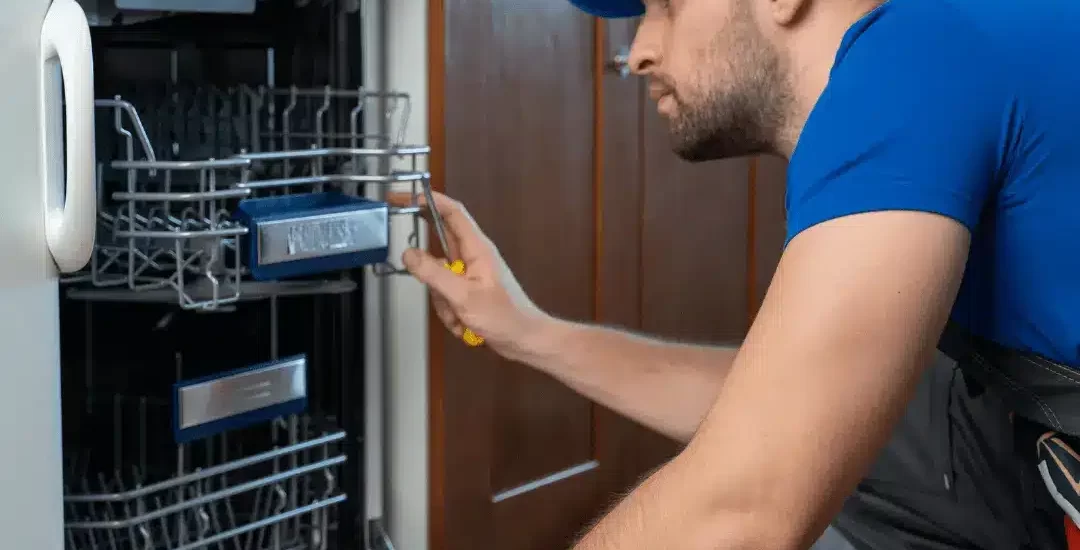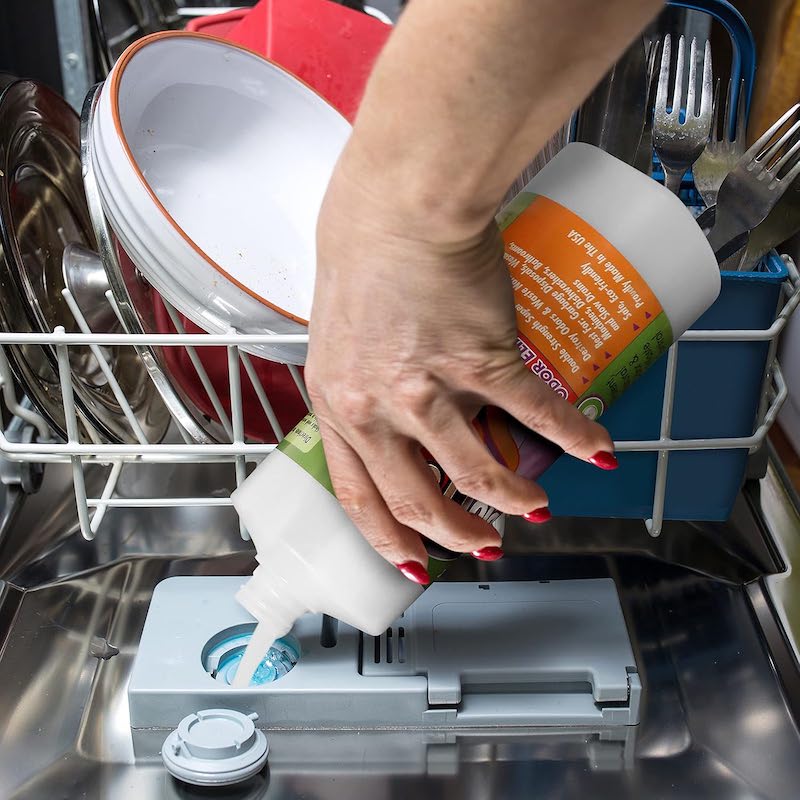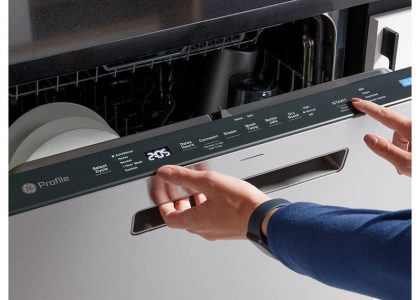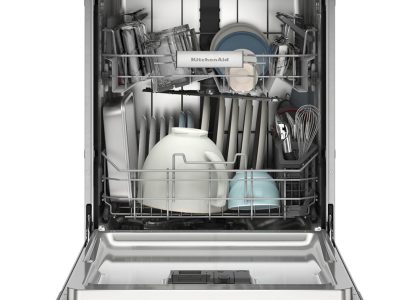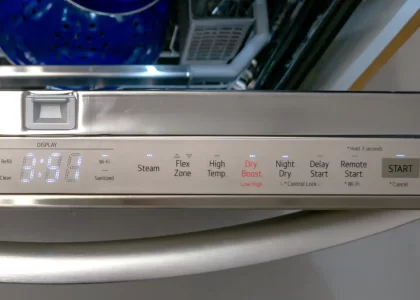Common Causes of Dishwasher Sewage Smells
Why does my dishwasher smell like sewage? Determining why your dishwasher smells like sewage is the first step in addressing foul odors. Several factors may contribute to this unpleasant situation. Here are the most common culprits:
- Food Accumulation: Leftover food particles can get trapped in the filter or crevices, decompose over time, and create a sewage-like odor.
- Grease Buildup: Grease and oil from dirty dishes can coat the dishwasher’s interior, promoting bacterial growth that emits foul smells.
- Drain Hose Issues: A kinked or clogged drain hose may prevent water from draining correctly, leading to standing water that becomes malodorous.
- Faulty Garbage Disposal Connection: If your dishwasher is connected to a garbage disposal, a blockage or malfunction there can cause sewage odors to back up into the dishwasher.
- Ventilation Problems: Proper ventilation is vital in preventing odor buildup; if the dishwasher’s vent is obstructed, it can’t circulate air effectively.
- Mold and Mildew: Warm and moist conditions inside the dishwasher are perfect for mold and mildew growth, which often carries a musty, sewage-like smell.
Understanding these causes will guide you in choosing the right troubleshooting and cleaning strategies to eliminate the odors and maintain a fresh-smelling dishwasher.
Initial Troubleshooting Steps
When you first notice why does my dishwasher smell like sewage, quick action is key. Begin with these initial troubleshooting steps to target the odor’s source:
- Check the Filter: Examine your dishwasher filter for trapped food particles. Clean it thoroughly to remove any debris.
- Inspect the Drain Hose: Ensure the drain hose isn’t kinked or blocked. Correcting any hose issues might solve the problem.
- Run a Rinse Cycle: Empty the dishwasher and run a hot water rinse cycle. This can help flush out any lingering odors.
- Look Inside for Obstructions: Look for any visible blockages inside the dishwasher that could be causing the smell.
- Evaluate the Garbage Disposal: If your dishwasher connects to a garbage disposal, check for clogs or needed maintenance there as well.
- Assess Ventilation: Confirm that the dishwasher vent is clear and functioning to allow adequate air circulation.
Each of these steps helps you to identify the origin of the smell. Tackling these troubleshooting tasks often resolves the issue without the need for further intervention.
Cleaning Techniques to Eliminate Odors
Once you notice that why does my dishwasher smell like sewage, it’s important to act immediately. Here are several techniques to help you get rid of these odors:
- Use Baking Soda: Sprinkle a cup of baking soda across the bottom of the dishwasher. Run a short, hot water cycle overnight for optimal results.
- Vinegar Wash: Fill a dishwasher-safe bowl with white vinegar. Place it on the top rack and run a full cycle to help neutralize odors.
- Citrus Rinses: After completing a vinegar wash, you can add a touch of freshness by using citrus peels. Simply place lemon or orange peels in the cutlery rack and run a short cycle.
- Enzyme-Based Cleaners: Consider using enzyme-based dishwasher cleaning products. Follow the manufacturer’s instructions closely for the best outcome.
- Hot Water Flush: Perform regular flushes with hot water to prevent buildup that can trap odors. This also prevents grease from solidifying in the dishwasher.
- Clean Seals and Small Components: Use a toothbrush dipped in a mixture of warm water and mild soap to scrub around the door seal and any other small components where grime might hide.
Regular use of these cleaning techniques can effectively eliminate and prevent the recurrence of sewage-like odors in your dishwasher. Be proactive in your approach and you’ll enjoy a fresh-scented dishwasher throughout its lifespan.
Maintenance Tips to Prevent Future Smells
After tackling why does my dishwasher smell like sewage, maintaining a scent-free appliance is essential. Consistent care can prevent foul smells from returning. Here’s what to do:
- Run Regular Cleaning Cycles: Use a monthly cleaning cycle with dishwasher cleaning agents to prevent debris buildup.
- Wipe Interior Surfaces: After each use, quickly wipe down the interior surfaces to remove food particles and grease.
- Keep the Filter Clear: Regularly remove and rinse the dishwasher filter to avoid clogs that trap odors.
- Use Rinse Aids: Rinse aids help water drain off more easily, hindering mildew and mold growth.
- Dry After Use: Leave the dishwasher door ajar after cycles to let moisture escape and air circulate.
- Deal with Drain Hose Problems: Examine the drain hose periodically to ensure it’s not forming kinks or clogs.
- Garbage Disposal Maintenance: If connected, run the garbage disposal regularly to prevent backflow smells.
By following these simple steps, you can keep your dishwasher smelling clean and extend its lifetime.
When to Clean or Replace the Dishwasher Filter
Identifying why does my dishwasher smell like sewage often leads back to the filter. Regular cleaning is vital, but knowing when to clean or replace it is crucial for odor prevention. Clean your filter whenever you notice debris, residue, or a persistent smell. This should be part of your routine maintenance every 3-6 months, depending on usage.
If deep cleaning doesn’t remove the odors or if the filter is damaged, replacement is the next step. A damaged filter can’t trap particles effectively, leading to smells and possible damage. Check your manufacturer’s guidelines for replacement frequency. Most recommend yearly replacement, but heavy use might require sooner action.
Replace the filter if:
- Odor persists: After cleaning, if the sewage smell remains, the filter might be beyond salvage.
- Visible damage: Cracks or breaks in the filter can allow food particles to escape, causing odors.
- Poor dishwasher performance: If dishes aren’t getting clean, the filter could be clogged beyond cleaning.
Regular attention to the dishwasher filter will contribute greatly to preventing foul sewage odors.
Troubleshooting Plumbing Issues Related to Dishwasher Smells
Sometimes, the root of why does my dishwasher smell like sewage lies in plumbing issues. Here are key steps for troubleshooting:
- Check the Sink Trap: This can collect debris and cause odors. Clear out any clogs.
- Inspect Drain Lines: Blocked or slow-draining pipes might be the issue. Ensure they are clear.
- Examine Air Gaps: For dishwashers with an air gap, confirm it’s not clogged.
- Assess Water Flow: Restricted water flow can lead to odor. Verify that water runs freely.
- Look for Leaks: Leaks in plumbing can cause dampness and mold. Repair any found.
- Garbage Disposal Function: Make sure it’s working right. A malfunction can cause bad smells.
Plumbing issues can be complex. If these steps don’t fix the problem, consider calling a professional. An expert can diagnose and resolve hidden plumbing problems.
Professional Solutions and When to Call a Plumber
When home remedies fail to address why does my dishwasher smell like sewage, it’s time to seek professional solutions. Persistent odors may signal deeper plumbing or mechanical issues that require a plumber’s expertise. Here’s when you should consider calling in a professional:
- Recurring Smells: If smells persist after you’ve tried all DIY methods, a plumber can pinpoint the issue.
- Slow Drains: If your sink or dishwasher drains slower than usual, a plumber can clear the blockage causing odors.
- Water Backflow: This is a sign of major plumbing trouble. A plumber can fix backflow problems to prevent odors.
- Strange Noises: Gurgling or bubbling sounds from your dishwasher or sink need a professional’s attention.
A qualified plumber can provide a thorough inspection, identify the exact cause, and offer a long-term solution. They have the tools and experience to deal with complex problems out of reach for most homeowners. Remember, timely action can save you from costly repairs later. If you’ve exhausted the cleaning and maintenance steps listed and odors continue, don’t hesitate to call a plumber. Keep your dishwasher and plumbing in top shape to avoid these smells altogether.
Prevention: Best Practices for a Fresh-Smelling Dishwasher
Preventing that dreaded why does my dishwasher smell like sewage question is key to a fresh kitchen. Here are actionable steps to ensure your dishwasher stays odor-free:
- Run Weekly Cleans: Routinely cleaning with a dishwasher-safe cleaner will keep smells at bay.
- Wipe Spills Immediately: Quick wipe-downs prevent food and grease from lingering.
- Check and Clean Filters Regularly: A clean filter is crucial for an odorless machine.
- Use the Right Detergent: Quality dishwasher detergents combat residue better than lower-quality options.
- Leave the Door Open: After cycles, keep the door slightly open to dry out the interior.
- Inspect and Deodorize Regularly: Use vinegar and baking soda to neutralize potential smells.
- Monitor the Drain Hose: Ensure it is free from kinks and blocks to prevent stale water.
- Schedule Maintenance Checks: Yearly inspections by an expert can catch issues early.
By applying these best practices diligently, you can say goodbye to bad dishwasher smells for good.

